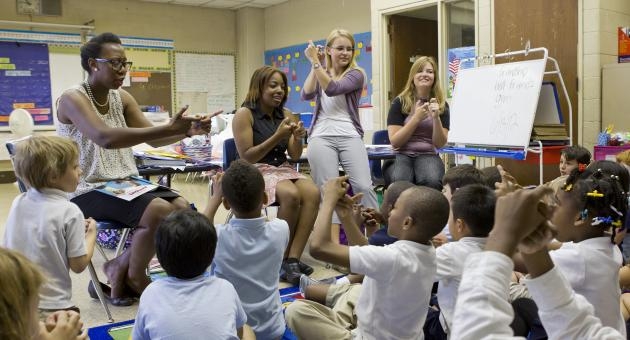Students experience rural and urban classroom diversity first hand

Four education majors – two from Simpson College in Iowa and two from Temple University – spent the past month exploring the diversity of rural and urban classrooms and cultures as part of the Simpson-Temple Exchange Program. In the process, Kaylin Womack, Kashonda Mann, Meg Parks and Cora Musfeldt not only deepened their understanding and appreciation for differences but also made decisions about where and how they’d like to teach.
The program was started in 2009 by Temple’s College of Education with the support of Temple Alumna Carol Zahn Booth, ’47, who wanted to help future teachers expand their understanding of diversity. Participants spend two weeks in rural classrooms and two weeks in urban classrooms, taking in both the similarities and differences among the students, teachers and environments. They also live together and explore the food and fun in each locale, which gives them a chance to get to know each other and digest the day’s events.
“This program helps them think about their own careers and interests, as well as break through preconceptions, which they all had,” said program manager Marilyn Weber. “It also prepares them to teach in any type of setting.”
For the first two weeks of the program, the city women went to the country where, with the Simpson students, they visited and worked at three different schools in Indianola and Des Moines, IA.
Kashonda Mann, a junior at Temple from Philadelphia, said the experience made her realize the important role the school environment played. There was more space at the schools in Iowa which she thought might make learning easier. She also compared the students’ diets.
“After seeing how kids responded and reacted in Iowa vs. Philly, I started to think about the differences in what they were eating,” she said. “In Iowa, the kids ate a fresh lunch and afterwards were calm and able to get back to work. The kids I’ve seen in urban schools are wired and have a hard time concentrating after lunch and I wonder if it’s because they eat more processed foods.”
Mann also came to appreciate the different backgrounds students come from.
“I’ve always tried to be sensitive to diversity. But now I think we’re more sensitive and aware of things we might not have noticed before. If a boy has his head down on the desk for example, and I need him to be doing his work, I’ll now think ‘What’s happening at home or in his neighborhood?’”
Kaylin Womack, a senior at Temple from Houston, TX, agreed. “I understand everyone comes from different backgrounds and now I can see how teachers can try to use that background to help students grow and become leaders,” she said. At Greenfield Elementary in Philadelphia, Womack and her colleagues saw how one of the teachers made the many languages spoken by her students part of the lessons.
Senior Meg Parks, one of the Simpson students, wasn’t sure where she wanted to teach after graduation and thought the exchange would help her figure this out. Sure enough, she now feels as though she could teach anywhere. Cora Mustfeldt, also a senior at Simpson, went into the program knowing that she wanted to teach in an urban area. For her, the program gave her perspective on how another city’s schools operate.
Both think the experience has opened their minds.
“I wanted to see a bigger city and how things are handled so I could take it back to Iowa,” said Musfeldt, who is from Lacona, IA.
Parks, who is from Kearney, MO, said she likes to think of herself as open-minded. “But this let me experience things I wouldn’t be able to live in Iowa and Kansas City,” she said.
After full days in the classroom, journaling about their experiences, and discussing issues with Weber and Patti Woodward-Young at Simpson College, the foursome would head out at night and on the weekends. In Iowa this meant hot air ballooning and an outdoor ropes course, eating very well and getting around entirely by car in a region where people don’t honk their horns except to say hi, or lock their cars.
In Philly, there was more good eating, which led to a debate about the merits of cheese whiz, and historical sight-seeing, as well as – to the Iowans at least – a surprising amount of security, including gates and security guards in the schools.
The foursome report becoming fast friends. As much as they learned from their classroom visits, they most appreciated being able to talk with each other and share newly formed ideas about education, diversity and how they want to teach. They expect this to continue long after they say good-bye.
“We’ll be able to call each other in the years ahead and say, ‘Hey, listen to what happened to me today; what do you think?’” said Womack.